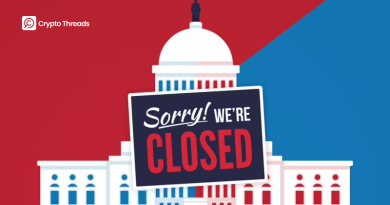Senate Crypto Hearing Faces Low Turnout: What This Means for Digital Asset Market Structure
Only 5 out of 11 senators attended the crucial bipartisan hearing on crypto market structure legislation, raising questions about political commitment to digital asset regulation
US Senate hearing room ( bitcoinmagazine )
Key Takeaways
The US Senate Banking Committee’s digital assets subcommittee experienced notably low attendance during Tuesday’s hearing on crypto market structure, with only five senators present out of the usual 11 members. This sparse attendance occurred despite the hearing’s significance for shaping America’s digital asset regulatory framework.
Why Senator Attendance Matters for Crypto Regulation
The Numbers Tell the Story
Senator Cynthia Lummis, the subcommittee chair, acknowledged the poor turnout, attributing it to “competing committees” scheduled for the same day. The attending senators included:
- Republicans: Cynthia Lummis, Dave McCormick, Bill Hagerty, Bernie Moreno
- Democrats: Angela Alsobrooks (sitting in for ranking member Ruben Gallego)
Crypto legislation progress visual ( paulhastings )
Expert Panel Discusses Market Structure
The hearing featured testimony from key industry figures:
- Rostin Behnam: Former CFTC Chair
- Ryan VanGrack: Coinbase VP of Legal
- Greg Xethalis: Multicoin Capital General Counsel
- Sarah Hammer: University of Pennsylvania Executive Director
Political Tensions Emerge Around Trump Administration
Conflicts of Interest Concerns
Senator Lummis raised pointed questions about potential conflicts of interest, stating: “Maybe this is about concern that certain people that have family members in the administration are going to be advantaged in some way by what we’re doing.”
This comment reflects growing Democratic concerns about President Trump’s crypto investments and their family’s involvement in the digital asset space.
Digital asset market structure framework ( Superex )
Bipartisan Support Under Question
Despite the GENIUS Act passing the Senate 68-30 last week, some Democrats now suggest they may oppose future legislation without provisions addressing presidential crypto ties.
Senate vs House: Competing Crypto Frameworks
Current Legislative Landscape
Senate Progress:
- ✅ GENIUS Act passed (stablecoin regulation)
- 🔄 Market structure bill in development
House Advancement:
- ✅ CLARITY Act cleared committees
- ⏳ Floor vote expected soon
CLARITY Act legislative progress
Key Regulatory Principles Released
Republican senators unveiled their market structure framework emphasizing:
- Clear distinction between digital securities and commodities
- Shared regulatory oversight preventing single-agency dominance
- Pro-innovation anti-money laundering protections
- Regulatory sandboxes and safe harbors
What Low Attendance Reveals About Crypto Politics
Scheduling Conflicts or Waning Interest?
The sparse attendance raises critical questions:
- Are senators prioritizing other legislative matters?
- Does this signal reduced urgency for crypto regulation?
- Will bipartisan support continue?
Senator Lummis expressed concern about developing legislation “that the other side of the aisle feels they haven’t had adequate input in.”
Senate banking committee discussion
Industry Implications and Market Impact
Regulatory Uncertainty Continues
The hearing’s low turnout could signal:
- Delayed timeline for comprehensive crypto regulation
- Increased regulatory uncertainty for digital asset markets
- Potential partisan divide on future legislation
Global Competition Concerns
Senator Lummis emphasized competitive pressures: “While the European Union and Singapore have established clear regulations, the U.S. continues to sit on the sidelines while the digital asset industry seeks greener pastures.”
US regulatory outlook for crypto ( elliptic )
Looking Ahead: Next Steps for Crypto Legislation
Three Potential Pathways
Congress faces three strategic options:
- Pass GENIUS Act unchanged
- Merge with House stablecoin legislation
- Package stablecoin and market structure bills together
Timeline Expectations
With the CLARITY Act expected for House floor vote soon and Senate Republicans pushing their framework, the next few months will be crucial for determining America’s crypto regulatory future.
Conclusion
Tuesday’s low-attendance Senate hearing highlights the ongoing political challenges facing comprehensive crypto regulation in America. While technical discussions on market structure continue, the real battle may be political – ensuring sufficient bipartisan engagement to pass meaningful legislation.
The crypto industry’s $250 million investment in the 2024 election cycle demonstrates the stakes involved. Whether senators can overcome scheduling conflicts and political tensions to deliver the regulatory clarity the industry seeks remains an open question.



